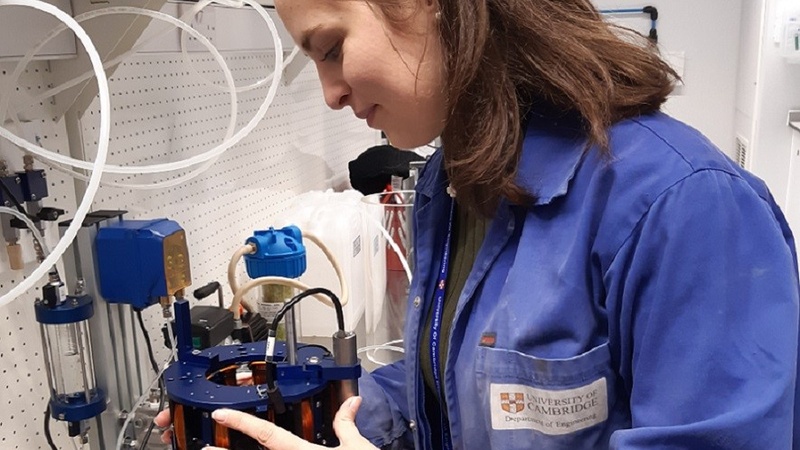Geotechnical Engineering Student Marisa Contrafatto is working with Professor Giulia Viggiani to characterise the behaviour of partly saturated expansive clays at small strain using the suction-controlled Resonant Column/Torsion Shear (RCTS) apparatus recently installed in the NRFIS Geomechanics Laboratory.

WindAfrica is a £1.27M GCRF project which aims to support the development of renewable energy from onshore wind in Africa. The aim of the project is to develop a set of reliable and economical design guidelines for piled wind turbine foundations to suit the unsaturated expansive soil conditions of Africa, which are particularly sensitive to soil moisture changes. This collaborative project is led by Durham University and researchers from the University of Cambridge and the University of Pretoria, and is funded by the Engineering and Physical Sciences Research Council.
As part of the wider picture, Marisa Contrafatto is investigating the mechanical behaviour of partly saturated Black Cotton clay from Al Fao, Sudan, and Atta clay from Steelpoort, South Africa, to evaluate the stiffness of the soils at low and medium strain levels.
Undisturbed soil samples were collected during a ground investigation undertaken in 2019 and sent to NRFIS for testing of their water retention characteristic and stress-strain behaviour using a variety of equipment, including the newly installed suction-controlled Resonant Column Torsional Shear (RCTS) apparatus.
“The correct description of small deformations is an important element in the prediction of the likely movements of foundations under complex loading. It will have a great impact on the quality of the predictions of the performance and continued serviceability of wind turbines. With traditional resonant column apparatus, strain ranging from 0.001% to 0.1% can be difficult to investigate for unsaturated soils because of the inability to control the sample suction”, says Marisa.
The NRFIS RCTS apparatus can perform resonant column, torsion shear and decay tests on soil samples with diameters of 38mm and 50mm. It consists of three main parts: the cell, the control box and the measurement system and allows the experimental investigation of the stress-strain behaviour of cylindrical soil samples in isotropic confinement. The bottom end of the sample is fixed while the top end is excited in torsion using an electromagnetic drive with variable frequency.
Comprehensive characterisation of the small strain behaviour of unsaturated soil during hydraulic hysteresis requires precise control of the stress state, matric suction, and degree of saturation. Unlike traditional Resonant Column apparatus, the NRFIS RCTS apparatus has been specifically designed to allow the control of suction, up to 500kPa, by the axis translation technique. It has also been uniquely built with the air and water circuits on separate ends of the sample (with gas to the top), maximising the surface available for the water exchange, and avoiding water flow through air circuits.
As part of the experimental program, Marisa will be performing both tests on saturated and unsaturated samples, reconstituted from slurry in a consolidometer, and suction-controlled tests on samples compacted at different water contents with different initial suctions. The results will feed into the future work being undertaken by Durham University and the University of Pretoria, who will be developing advanced numerical tools to assess the response of wind turbine foundations exposed to complex loading, and changes in water table and soil moisture content.
The equipment and laboratory facilities at NRFIS are open and available to industry and all academic institutions and centres to support delivery of interconnected, integrated, and interdisciplinary research for UK infrastructure.
For further details about the suction-controlled RCTS apparatus available at NRFIS, or to find out more about booking our facilities, please contact one of our NRFIS team members to discuss your project requirements.
To read more about the WindAfrica Project, visit: http://community.dur.ac.uk/wind.africa/
